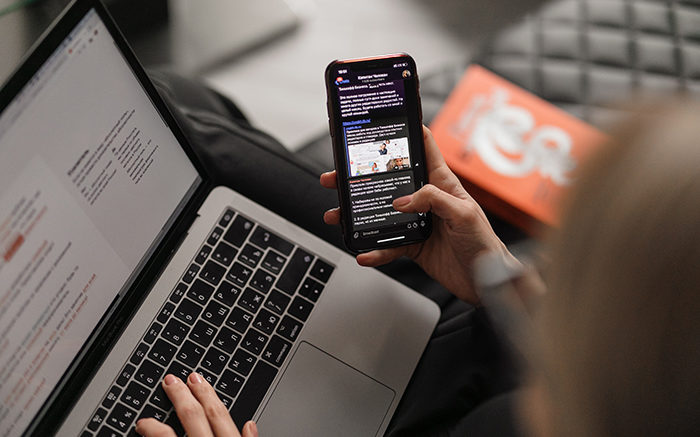As an individual living in the 21st century, you have likely heard of the threat that hackers pose to our computers and network security. However, you may not realize that if it is electronic, it can be hacked or compromised, and that includes your cellular devices. This is especially unsettling news considering that we do most of our daily activities on our phones, including shopping, browsing email, and our online banking, among other confidential acts.
While the risks are real, cellular users can do their best to protect their precious data by being informed of common scams and being proactive about how to avoid them. If you use your mobile devices daily, this could be the most important article you ever read.
Know the Risks
To really appreciate the importance of security with your mobile device, you need to know the damage that can occur if your phone or tablet is hacked. Just about any piece of stolen information can be used maliciously. If a hacker gets your email address, they can use it to send phishing emails to your contacts. If you do your banking on your phone, and a hacker gains access, then they can use your card information to take out fraudulent loans that could quickly lead to financial trouble, including eventual bankruptcy.
When it comes to the theft of card information, keep in mind that it doesn’t only have to be at the hands of a hacker. Sometimes, the user may unknowingly give out this information. Even if you do most of your shopping online, you must be cautious about giving out your payment information. To protect yourself, make it a point to never provide a card number if you did not initiate the call yourself or you were not expecting it. If you are making purchases over the phone, be sure to verify these sales on your credit card statement and watch for discrepancies.
It is important to point out that your calls may not be as confidential as you believe them to be, and it is not always cybercriminals who are listening in. When investigating a crime, police agencies may tap an individual’s phone to obtain evidence. You should know that you have rights on this matter. To listen in, police need to obtain a wiretap order that gives them the legal right to monitor the call. If they don’t have this document, you may be able to sue them for taking unlawful actions.
Common Scams
If you really want to take your cellular security seriously, then you need to be aware of common scams and how to avoid them. In many cases, cybercriminals turn to social engineering scams, including phishing emails, to try to trick you into clicking a malicious link or attachment that will allow hackers unlawful access to your device. Phishing scams typically come in the form of an email as the hacker pretends to be a figure of authority such as your bank or a government agency like the IRS. They will tell you that your account is compromised, you are late on your taxes, or any other lie to try and get you to panic and click on the link.
Phishing scams can also come to you in the form of text messages that may include offers for exciting giveaways or promising job opportunities. But beware that by even clicking on the link in the text message, you could unknowingly download malware onto your device. When it comes to phishing scams, it is important to remember that banks and government agencies will never ask for personal information via email or text, and they usually won’t ask you to click on links. If you get a suspicious email from your bank or a store, go to the website first to see if the communication was legitimate or get the company’s official phone number and call to inquire.
Another common scam that takes place in public establishments is network spoofing, which is essentially a fake Wi-Fi connection that is meant to look like the real network at the restaurant or coffee shop. Sometimes, the hacker might spice up the name of the network to something more appealing like “Free Coffeehouse Wi-Fi” to lure in potential victims. However, when you connect to these fake networks, you are essentially providing direct access to your device to the cybercriminal. To avoid this issue, always go to a store employee and verify the correct Wi-Fi network.
Protect Your Devices
Many dangerous cellular scams are going on in the world, and hackers will only continue to create new methods of attack. To ensure that you are best protected in all instances, you need to be proactive in securing your device. This starts with having a password on your phone that is difficult to guess. It should have a combination of numbers, special characters, and upper and lowercase letters. To double your security, add a form of multi-factor authentication onto your phone. Along with the password, this is a second action that must be taken to gain access, such as fingerprint scan or facial recognition. That way, the only person who can use your device is you.
Even if you are not looking to connect to a network, hackers can still attempt to access your device through Wi-Fi or Bluetooth just because you have those features activated. To be extra careful, turn these functions off when not in use. An even easier way for hackers to use your cellular device is by stealing it when you leave it unattended. Remember, it only takes a second for someone to snatch your phone off a table or desk, so always keep your device with you.
If your device is stolen or compromised, there are methods that you can implement now to protect your data. First, make sure that your phone is encrypted. For iPhone users, activate the “data protection” feature. Android devices usually have automatic encryption. With this feature activated, hackers will not be able to read or use your information even if they are successful in connecting to it. You should also look into installing an antivirus program onto your phone and run weekly scans to check for malware and spyware.
These days, we use our cell phones more than just about any device, so protection is as important here as it is with your home computer. Take a few moments to implement these security steps now, and you will be protected later.





